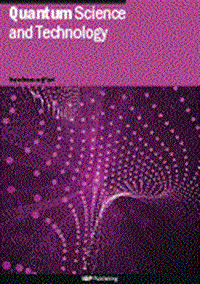解纠缠量子自编码器
IF 5
2区 物理与天体物理
Q1 PHYSICS, MULTIDISCIPLINARY
引用次数: 0
摘要
纠缠量子态对噪声高度敏感,这使得它们难以通过有噪声的量子信道传输或存储在量子存储器中。本文提出解纠缠量子自编码器(disentangling quantum autoencoder, DQAE),将纠缠态编码为单量子比特积态。与未编码状态相比,DQAE提供了在跨量子位丢失或泄漏通道传输纠缠态所需的副本数量的指数级改进。DQAE可以从纠缠量子数据中以无监督的方式进行训练。对于一般状态,我们使用基于纯度代价函数的梯度下降变分量子算法进行训练,而稳定状态可以通过Metropolis算法进行训练。对于特定类别的状态,需要泛化的训练数据的数量出奇地低:对于稳定状态,DQAE通过学习与量子比特数量线性扩展的大量训练数据进行泛化,而对于使用横场伊辛哈密顿量进化的状态,仅1个训练样本就足够了。我们的工作为增强近期量子计算机提供了实际应用。本文章由计算机程序翻译,如有差异,请以英文原文为准。
Disentangling quantum autoencoder
Entangled quantum states are highly sensitive to noise, which makes it difficult to transfer them over noisy quantum channels or to store them in quantum memory. Here, we propose the disentangling quantum autoencoder (DQAE) to encode entangled states into single-qubit product states. The DQAE provides an exponential improvement in the number of copies needed to transport entangled states across qubit-loss or leakage channels compared to unencoded states. The DQAE can be trained in an unsupervised manner from entangled quantum data. For general states, we train via variational quantum algorithms based on gradient descent with purity-based cost functions, while stabilizer states can be trained via a Metropolis algorithm. For particular classes of states, the number of training data needed to generalize is surprisingly low: for stabilizer states, DQAE generalizes by learning from a number of training data that scales linearly with the number of qubits, while only 1 training sample is sufficient for states evolved with the transverse-field Ising Hamiltonian. Our work provides practical applications for enhancing near-term quantum computers.
求助全文
通过发布文献求助,成功后即可免费获取论文全文。
去求助
来源期刊

Quantum Science and Technology
Materials Science-Materials Science (miscellaneous)
CiteScore
11.20
自引率
3.00%
发文量
133
期刊介绍:
Driven by advances in technology and experimental capability, the last decade has seen the emergence of quantum technology: a new praxis for controlling the quantum world. It is now possible to engineer complex, multi-component systems that merge the once distinct fields of quantum optics and condensed matter physics.
Quantum Science and Technology is a new multidisciplinary, electronic-only journal, devoted to publishing research of the highest quality and impact covering theoretical and experimental advances in the fundamental science and application of all quantum-enabled technologies.
 求助内容:
求助内容: 应助结果提醒方式:
应助结果提醒方式:


